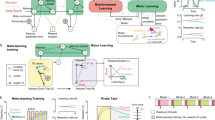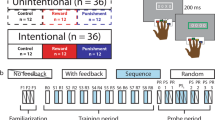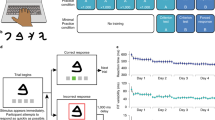Abstract
ONE of us (S.D.P.)1 has described what be believes to be a novel procedure in psychological research. It is based on a well-attested observation that, if individuals repeat after a brief interval of time a section of a simple maze, some very surprising perseverative tendencies become apparent.
This is a preview of subscription content, access via your institution
Access options
Subscribe to this journal
Receive 51 print issues and online access
$199.00 per year
only $3.90 per issue
Buy this article
- Purchase on Springer Link
- Instant access to full article PDF
Prices may be subject to local taxes which are calculated during checkout
Similar content being viewed by others
References
Porteus, S. D., Barclay, J. E., Culver, H. S., and Kleman, J. P., Perceptual and Motor Skills, 10, 215 (1960). Porteus, S. D., and Kleman, J. P., The Mankind Quarterly, 1, 23 (1960). Porteus, S. D., Revue de Psychol. App., Paris (in the press); Boll. Psicol. App., Italy (April 1960).
J. Exp. Pedagogy (June 1915).
Author information
Authors and Affiliations
Rights and permissions
About this article
Cite this article
PORTEUS, S., DIAMOND, A. Measurement of Psychomotor Perseverative Tendencies. Nature 189, 691–692 (1961). https://doi.org/10.1038/189691b0
Issue Date:
DOI: https://doi.org/10.1038/189691b0
Comments
By submitting a comment you agree to abide by our Terms and Community Guidelines. If you find something abusive or that does not comply with our terms or guidelines please flag it as inappropriate.



